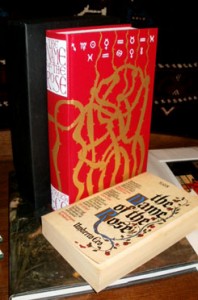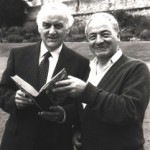The Name of the Rose (1983) was not just a novel but a way of thinking about the world. At the passing of its author Umberto Eco it is appropriate to reflect on the book and what it means.
In the 80s when I began book collecting a friend told me that The Name of the Rose was the best book he had read in years. He had to have a fine first edition. He searched all the London booksellers including Foyles and Hatchards in Piccadilly. No luck since all they had was reprints. It seems ‘word of mouth’ had made it a best seller. This is very unusual for the author was an Italian academic whose reputation was know to very few (if any general readers). In addition, the setting in medieval Italy with warring states and religious heretics and horrible crimes did not appear to be obviously appealing.
So why does it appeal? The first response is naturally the unfolding story that is in the form of a mystery, a whoddunit. The central character, Brother William of Baskerville is an elusive intellectual Holmesian figure, and so he sets about unravelling a murder. The writer is like Dr Watson merely recording what happened. Then we come to the descriptive powers of the author. The book drips with details of incisive knowledge of what it was like in a monastic institution in turbulent times. The narrator shows us a world that knows no bounds – it is, on the surface – of abbots, libraries, beliefs – but these are merely elements that make up a culture or world view. A view threatened or at an impasse? Then of course, are the political schemes, the rulers and oppressed, the followers of this way or that. Who is right? Who will inherit the Earth? All this is be found and enjoyed. As the novelist and critic Anthony Burgess said, “I rejoice and the rest of the literate world will rejoice”.
Thanks to Umberto Eco for all that this beautiful and enriching novel embodies. The Folio Society issued a handsome illustrated edition (pictured here).












